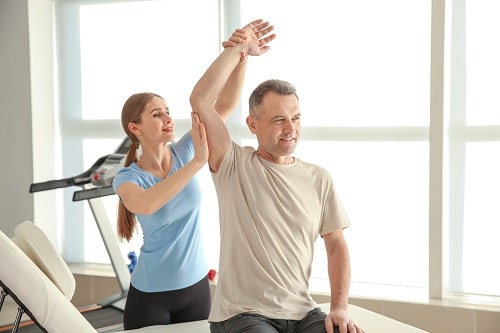Going back to normal after suffering an injury from an illness, physical activity or unbearable pain due to a musculoskeletal condition can be a difficult process to do alone. Moreso, if the injury resulted from a stroke, that could leave an entire side of your body immobile.
Physiotherapy or Physical therapy can help one function, move and live better. Licensed therapists can use recommended exercises to treat various conditions so you can get back to your everyday routine before an injury or illness interrupted your life.
Not attending to these injuries and ailments could be detrimental. Rehabilitation must be applied so as not to worsen the condition or leave one permanently disabled. It is believed that 90 days after recovery from a stroke, a patient must have physiotherapy as this is considered the ‘golden period’ of recovery. Most neurological recovery happens during this phase, and relearning movements is crucial.
Therapists can significantly help in improving one’s quality of life. Here are ways how going to physiotherapy can affect your recovery:
-
It Relieves Your Pain
When you suffer pain from RMI or repetitive motion injury like carpal tunnel syndrome, you may have difficulties performing your work. The repeated performance of the same work cause injury from wear and tear of a particular body part and can be excruciatingly painful.
Aside from the pain, numbness and weakness could lead one to fail to perform a task, causing financial loss. PTs could employ interventions and exercises like manual therapy and stretches to improve the function of the hand and restore grip strength.
The technique used in the treatment can enhance the range of motion of the hand and fingers, thereby reducing the symptoms and alleviating one’s pain. If you have Carpal Tunnel Syndrome and need help, try the best physiotherapy Brampton area, they have the best PTs that could attend to your injury and rehabilitation.
-
Prevents Muscle Spasticity
If you suffered from a stroke causing a side of your body temporarily immobile, the disruption in muscle movement could cause it to contract. The tightening of the muscle may further lead to abnormal posture, permanent contraction, lasting spasms, and severe pain. Spasticity could also reduce one’s ability to resume the function of a particular body part.
Physiotherapy can prevent contracture by performing stretches that allow muscles to grow longer and more flexibly. PTs could also use a splint and a cast to maintain the range of motion and flexibility one has already achieved.
-
Strengthens Your Body
Traumatic Brain Injury or TBI will not only affect your mobility but may also weaken your body after the very dreadful ordeal. Since brain function is less efficient after a TBI, you may need extra effort and attention to do even a simple task.
Because of this, physical fatigue may be predominant. You may often feel exhaustion, weariness, and tiredness all the time. Physiotherapy exercises can help increase your endurance and strength, pace your movements, and eventually expand them as you progress with your therapy.
-
Improve Your Mental State
Having limited mobility after a stroke, TBI, and sports injury harm a person’s mental health. The feeling of helplessness and hopelessness because of the drastic change in their physical condition could further develop into depression, affecting one’s road to recovery.
Physiotherapy allows a patient to recover many movements affected by the injury or illness. Doing that gives one a sense of achievement, happiness, and satisfaction that could boost one’s morale and give one more zest to work on other weaknesses affected by the injury or ailment.
Increasing their strength and endurance through exercises also releases dopamine, a neurotransmitter responsible for giving you a general feeling of pleasure. It’s a ‘feel-good’ chemical that helps you focus, achieve your goals and improve your mood.
-
Improve Balance And Coordination
Being confined to bed for a long time after a TBI or a sports injury could take a toll on a person’s body and affect their gait, balance, and coordination. Licensed PTs will utilize approved exercises appropriate for your deficit to improve your flexibility, posture, mobility, and enhance coordination.
During the first few days of your therapy, you might think that it’s impossible to regain your normal movements, but as you progress, you’ll realize that you can do tasks by yourself and without assistance. This is one of the goals of therapy, to give you the independence to function without help from other people.
Conclusion
An injury or an ailment should not limit you to live your life. You’re confined only by the walls you build yourself. Experts and professionals have a range of tried and tested scientifically-based techniques that could help you reach your potential so you could get back on your feet in no time.

















